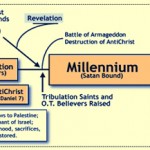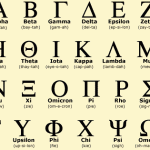Despite what I say below, I am a premillennialist. I believe in a future, literal, 1000-year earthly reign of Jesus Christ from Jerusalem. I want to state that first and foremost.
But I also believe that Premillenialism destroyed the Gospel. Here’s how:
Premillennialism is the belief that at some future point in time, Jesus will return to earth, set all things straight, and rule over the entire earth with righteousness and justice from Jerusalem for 1000 years. Among those who hold this view, it is also a commonly held belief that things will get worse before they get better. There are biblical prophecies which seem to indicate as much.
So when people who hold these two ideas read the Gospels, and specifically the announcments of Jesus that the Kingdom of God is at hand, that it is within us, among us, and breaking in on the world, they read such statements as prophecies about the future Millennium, and therefore, any instructions for how to live as Kingdom people or spread the Kingdom are pushed off into some future time.
In other words, it is argued that since the Kingdom did not fully “arrive” with Jesus, all the kingdom principles and values can be shoved onto a generation in the future by-and-by when Jesus return and sets all things right. Until then, the earth and most of the people in it can just go to hell.
 That is strongly stated, but it’s how we live. We revel in wars and rumors of wars, earthquakes, famines, and diseases because we think such things show that Jesus is about to return. And maybe it does, but that doesn’t mean that we can sit back, twiddle our thumbs, and watch it all with glee on the evening news.
That is strongly stated, but it’s how we live. We revel in wars and rumors of wars, earthquakes, famines, and diseases because we think such things show that Jesus is about to return. And maybe it does, but that doesn’t mean that we can sit back, twiddle our thumbs, and watch it all with glee on the evening news.
In fact, I k now some Christians who actually pray for things to get worse, because the worse things get, the better off Christians are. After all, doesn’t Jesus say that He won’t return until the days become like Sodom and Gomorrah? These Christians want to read about rape, murder, and pillage, because these are signs of the end times.
And yet, all such things are completely and utterly contrary to the Gospel message of Jesus Christ. The Gospel is not just about getting people to believe in Jesus so they can get eternal life and go to heaven when they die. While that is part of the Gospel message, it is only about 1% of it.
The rest of the Gospel concerns how those who have believed in Jesus should work to make the world better. The purpose of the Gospel message is to bless the people of the world, to stop injustice, to free the slaves, to rescue the captives, to break the chains of bondage, to bring peace to war-torn areas, to restore health to the sick, to take light into the darkness, and help to the hurting.
By putting off the Kingdom of God until “the future millennial reign of Christ” we have divorced most of the message of Jesus from the Gospel of Jesus. We have gutted the Gospel of it’s significance for our lives here and now, and made it entirely about the life ever after.
Premillennialism has done this.
I’m not saying we cannot be premillennialists. We can. I think the Bible teaches it. But we must avoid the pitfall of thinking that since Jesus will return at some point in the future to fix everything, we can just sit back and wait for it to happen. That is not the Gospel. That is not following the teachings or the example of Jesus.
So this year, what are you going to do to live the Gospel? How are you planning to restore kingdom principles into your life, your family, and your community?






